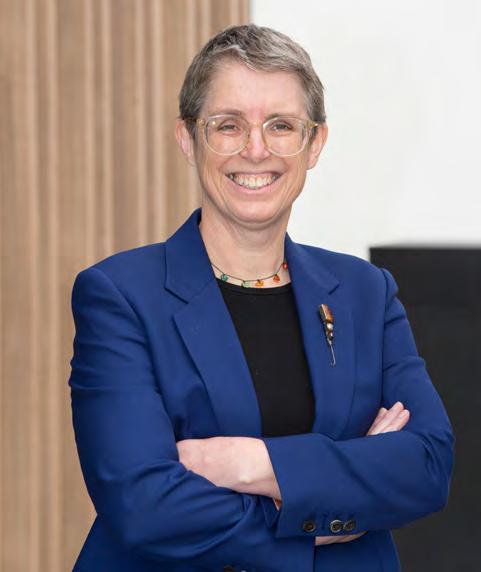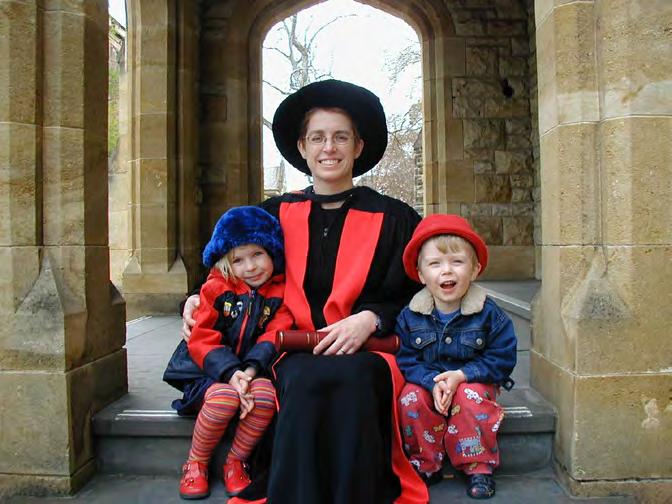
5 minute read
ASPS names its first female president
Plastic surgeon Associate Professor Nicola Dean aims to prioritise equal access and improve regulation of the cosmetic surgery industry in her new role
Plastic surgeon Associate Professor Nicola Dean has been named president of the Australian Society of Plastic Surgeons (ASPS). She is the first woman in the organisation’s 50-year history to be elected to the position. In her role as president of ASPS, as in her clinical work and research, Associate Professor Dean is committed to improving the health and safety of plastic surgery patients. Her priorities include improving the regulation of the cosmetic surgery industry and creating more equitable access to plastic surgery. Born in Edinburgh, Scotland, Associate Professor Dean graduated in Medicine from the University of Leeds in England. Between her fourth and fifth years of surgical training, she visited Adelaide to complete an eight-week elective in craniofacial surgery. However, after meeting her future husband and travelling back and forth between the UK and Australia, she eventually returned to Adelaide. She was appointed Head of Unit for Plastic Surgery at Flinders Medical Centre in 2014 and in this position she developed a dedicated breast reconstruction clinic for women who have had breast cancer. In the clinic, Associate Professor Dean pioneers a patient-led approach to ensure patients’ voices are heard. “At the clinic we take a patient-centred approach to understand our patients’ perspective on their reconstruction surgery,” she said. “Four times a year, we also involve patients in looking over our audits, our patient information sheets and our research to ensure that we are giving patients what they need.” Associate Professor Dean complements her clinical role with an interest in research and she now supervises a PhD candidate studying the health effects of post-natal muscle separation. In the past, she has seen the significant impact that research can have on healthcare, with a 12-year study into breast reduction informing the government’s approach to the procedure. “We showed that breast reductions can have the same impact on the pain experienced by patients as a knee or hip replacement. It was also incredibly cost-effective,” she said. “I feel good that the research allowed us to advocate for the provision of the surgery that attracts a Medicare rebate. “Sometimes there are inherent biases when health policymakers are predominantly male and the patients are predominately female,” she said. Associate Professor Dean is the daughter of two doctors: her father a general practitioner and her mother a psychiatrist. However, she was not encouraged to pursue a career in medicine, due to her parents’ understanding of the long hours and dedication the job required. “Medicine is very demanding and hard work. I could see my parents working very hard, but I could also see they had a very satisfying and rewarding life,” she said. There have been significant parallels between her work and that of her mother. As a child, Associate Professor Dean remembers stapling together a questionnaire for her mother as part of research she was co-writing on the psychiatric impact of breast reconstruction following breast cancer. In her own career, she has witnessed first-hand the role that breast reconstruction can play in women’s recovery. “I have seen how reconstructive surgery can change people’s lives,” she said.
Advertisement
Associate Professor Nicola Dean
“A lot of people misunderstand reconstructive surgery and think it’s all about looking glamorous or good in a bikini. But it’s about allowing women who have had a mastectomy to feel whole again and leave their cancer behind them. “It’s not for everyone, but for many women it can restore their confidence and help them get over cancer from a psychological point of view.” As president of ASPS, she aims to draw on this understanding of the importance of breast reconstruction to provide more equal access to Australians, including those who live rurally and remotely. Associate Professor Dean is acutely aware of the difficulty some women face in accessing reconstructive surgery and would like to make procedures available more equitably. “Nationally, I am very conscious that there is not an even distribution of access to breast reconstruction after mastectomy. “I’m working as part of a collaborative group with breast surgeons and consumers to develop principles on what should be the standards for breast reconstruction in Australia.”
Associate Professor Dean hopes to tackle geographical barriers to access and improve the referral system between general surgeons carrying out mastectomies and plastic surgeons who can offer reconstruction procedures.
The regulation of the cosmetic surgery industry is another priority for Associate Professor Dean in her new role.

She is concerned about the lack of information available to patients who are treated by cosmetic ‘surgeons’, leading to significant risk to their health. “It takes 12 years or longer to become a fully-trained specialist surgeon, but you can call yourself a cosmetic ‘surgeon’ after just five years’ training. Often, they lack the basic training on safety issues like infection control, deep venous thrombosis and post operative care,” she said. “Unfortunately, the public isn’t receiving the correct information about who is a properly trained surgeon.” As a specialist plastic surgeon, Associate Professor Dean has seen the impact of procedures carried out by poorly-trained cosmetic ‘surgeons’ on patients’ health. “I work in a public hospital, so I don’t see many primary cosmetic surgery patients. But last week I saw a patient who had a procedure to dissolve the fat in the neck suffering from very serious complications. “As doctors we should be ensuring we are working in the patient’s interests, but the lack of regulation of the cosmetic industry is a problem that is increasingly putting people in harm’s way.” Associate Professor Dean would like to see the title of ‘surgeon’ restricted, so it is easier for the public to understand the qualifications and training of those carrying out procedures. She is working with the Australian federal and state governments, RACS, Ahpra and other professional bodies to advocate for the changes. While Associate Professor Dean considers herself first and foremost to be a plastic surgeon, as a woman elected to the position as president of ASPS, she is pleased to be a role model for women considering a career in plastic surgery. She is aware of the unique pressures on women in the field, having had two children and completing her PhD within three years. “There is no doubt that it’s had its challenges balancing the need to do lots of hours to develop the necessary skills and having enough time for your mental health and wellbeing,” she said. “When I was in plastic surgery training it was very tiring and physically and mentally challenging. “It was tough, but I loved it.” Associate Professor Dean would like to help create a more flexible system where women do not have to choose between a surgical career and motherhood. “I think it’s entirely possible to be a mother and work in this job. It’s already starting to improve and it’s getting more common for plastic surgeons to have children. I think that’s wonderful.”
Associate Professor Nicola Dean with her children










